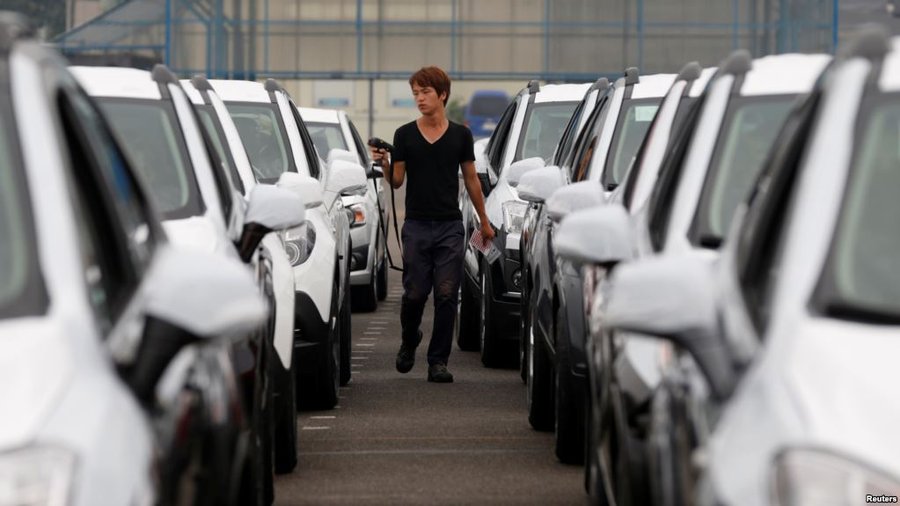GM Korea drops bankruptcy plan after last-minute wage deal

General Motors' South Korean unit dropped a plan to consider filing for bankruptcy after winning concessions on pay, bonuses and benefits from its labor union in a tentative deal reached on Monday.
The deal will pave the way for nearly $500 million in fresh capital injection by the South Korean government, providing much-needed liquidity to GM Korea to pay employees and its suppliers, but slumping vehicle sales and low factory run-rates raise questions about its longer-term future.
The concessions by GM Korea's powerful auto union are expected to heap pressure on other auto unions for similar moves, at a time when South Korea's auto industry is grappling with higher labor costs and sluggish demand from the United States and other markets.
"Through the latest agreement, GM Korea will be a competitive manufacturing company," Kaher Kazem, chief executive of GM Korea, said in a statement in Korean.
GM shocked South Korea in February when it unveiled a major restructuring plan for the money-losing unit, which involved shuttering one of its four plants in the country and voluntary redundancies for 2,600 workers.
The automaker had sought wage concessions from the union as well as government funding and incentives to save its remaining three South Korean factories.
The board of GM Korea delayed a decision on whether to file for court-managed bankruptcy protection until Monday evening after the automaker failed to reach a wage deal with its labor union in time to meet a Friday deadline.
'Huge concessions to save the company'
The union accepted the company's request to freeze base wages and skip bonuses for this year as well as trim benefits, according to the agreement seen by Reuters.
Future base wage increases and performance pay "will be dependent upon the company regaining profitability," while the base wage rises will not exceed inflation, it said.
Regarding its 680 remaining workers at the Gunsan factory, which is scheduled to be shuttered in May, the company will "implement options including a voluntary redundancy program and transfers" to other plants to avoid layoffs.
"The labor union made huge concessions to save the company," Hong Young-pyo, a lawmaker of the ruling Democratic Party who mediated the agreement, said at a news conference after the deal.
The union was absent from the press conference where Hong and GM executives were present.
A union spokesman declined to comment, saying union members are expected to vote on the preliminary deal on Wednesday and Thursday.
"Clearly it sets an example that a labor union cannot help but make concessions to overcome its company's crisis," Kim Soo-wook, a professor of operations management at Seoul National University, said.
"This will influence further labor conflicts and activities case by case depending on how bad the situations are for companies or how the global economy goes."
Hyundai Motor, South Korea's biggest automaker, is bracing for its annual talks with its labor union, after it posted a fifth straight drop in annual earnings last year as a lack of sport utility vehicles in the United States and a diplomatic row with China hurt earnings.
Adding further pressure on Hyundai, U.S. activist hedge fund Elliott Management said on Monday a restructuring plan proposed by the auto group to end circular shareholding structure was not enough, and recommended it create a holding company and increase dividend, among other things.
Doubts linger
The deal would pave the way for the Korea Development Bank (KDB) to provide support and for GM to allocate two new models to South Korea to help turn around GM Korea, the unit said in a statement.
State-run KDB is GM Korea's second-largest shareholder with a 17 percent stake. The U.S. automaker owns 77 percent of GM Korea, while GM's main Chinese partner, SAIC Motor Corp Ltd, controls the remaining 6 percent.
The government had stepped up pressure on GM and the union to reach an agreement, saying without a swift deal some 150,000 jobs at the automaker and its suppliers would be at risk.
GM Korea still needs to negotiate with KDB on terms of the latter's financial support to the unit, while trying to secure tax and other incentives from the industry ministry. KDB's chairman told Reuters last week the lender may sign a preliminary agreement by April 27.
Some analysts said the fate of GM Korea is still uncertain.
The unit's strength is small cars, but GM is scaling down its presence in that segment, said Lee Hang-koo, a senior research fellow at Korea Institute for Industrial Economics & Trade. "GM has extended the lifeline of GM Korea, but not sure how long it will last."
The South Korean unit, once the backbone of GM's Asian strategy, has been hobbled by labor costs and hurt by the automaker's decision to pull its Chevrolet brand from Europe, a key export market. It posted a net loss of $1.1 billion in 2017, its fourth straight year in the red.
The unit still makes more than 1 million assembled or partially assembled vehicles for the United States, European and emerging markets. It is also an engineering and design source for GM's small vehicles and electric vehicles, as well as home to some of GM's top-ranked suppliers globally.
Related News


